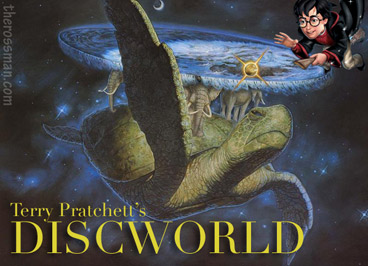
Terry Pratchett's Discworld
(Reviewed on 05/20/2009)
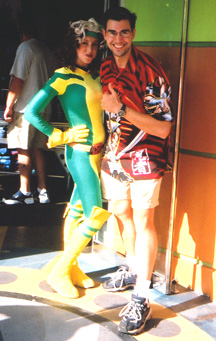
The Roguish ROSSMAN
Terry Pratchett's Discworld — where to fucking start?... Maybe I should point out that Terry Pratchett was Britain's biggest selling author of the 90s — and would have continued being so in the 2000s had it not been for a certain homeless woman who started writing about a poor little boy wizard with a scar on his face. Maybe I should begin by explaining that each of the 30+ Discworld novels takes a look behind the curtain of certain social customs, ideas, and accepted communal traditions and mocks the holy hell out of them by placing them in the context of a quasi-medieval, magic-filled world filled with people who see things for what they truly are. Mayhaps I should tell you that the Discworld itself is a flat world perched upon the backs of 4 giant elephants who themselves stand upon the shell of an even more enormous giant turtle named The Great A'Tuin, who glides through the cosmos like it's an infinite ocean... Maybe I should simply tell you that almost every book in this series is rated at least a "B" or a "B+" and receives the Rossman Seal of Infallible Perfection, with many making the highly coveted "A++ Fuck Yes" rating. Yeah, I think I'll start with that.
I love the Discworld (aka DW), and all of its inhabitants. I was a little iffy on the premise of the books when they were first recommended to me, but I had previously read one of Pratchett's early tomes (the collaboration with Neil "The God" Gaiman known as Good Omens: The Nice and Accurate Prophecies of Agnes Nutter, Witch, which I loved). But I looked at the size of the Discworld library and thought "I am NEVER going to read all that shit, no matter how good it is!" I started last February, and now, a little more than one year later, I just finished Pratchett's most recent DW novel, Making Money; I believe it was his 36th DW book. I just couldn't stop! I'd take a break from the series and try to read something else... but soon Rincewind, the Wizards, Granny Weatherwax, Nanny Ogg, the personification of DEATH, Susan, Lord Vetinari, Commander Vimes, and all the rest of the inhabitants of the DW would call me back... And I'd be obliged to listen. There's no going against Susan Sto-Helit or Granny Weatherwax when they summon you.
Yes, this review is going to be all giddy and verbally blow jobby. I can't hide my love for the Discworld series, and when something's just this massive and detailed, one can't help but drop references to certain things (characters, situations, episodes, etc.) and not bother to explain them all. As Neil Gaiman taught me, the best and most accurate description of something is the something itself; I'd be here for thousands upon thousands of pages telling you how great this series is if I went into every tiny detail of why these books are so [light] fantastic. Instead I'll have to accept that this review may appear goofy and overly loving and dorky (very dorky), because of the overabundance of inside jokes and references that I am about to make.... Don't look at me like I smell foul and have a duck on my head, just read them yourself and see by their own description how fucking marvelous they all are!
Pratchett's Discworld is a very difficult thing to describe in a short amount of time and space. There are a few stand alone storylines within it, but for the most part we follow one of several groups of repeating main characters in each book — sometimes these circles interact and mix with each other, and sometimes one crowd is a group of background characters in another group's main story. The main individual companies are as follows: The Witches (Granny Weatherwax, Nanny Ogg, Magrat Garlick, Agnes Nitt/Perdita X, the demonic tom cat Greebo, and eventually the witch-in-training Tiffany Aching); Rincewind and company (including Cohen the Ancient Barbarian, Twoflower the Asian tourist, and the trunk made of sapient pear wood); the Wizards of Unseen University (Archchancellor Ridcully, the mental Bursar, the Chair of Indefinite Studies, the Dean, the Senior Wrangler, the Lecturer in Recent Runes, Ponder Stibbons, and the orangutan Librarian); DEATH's clan (DEATH himself, his granddaughter Susan, the DEATH of Rats, and DEATH's butler [and founder of Unseen University] Albert); the Ankh-Morpork City Watch (Commander Vimes, Lord Vetinari, Nobby Nobbs, Sergeant Colon, Carrot Ironfoundersson, the troll Detritus, the hot werewolf Angua, the bearded dwarf woman Cheery Littlebottom, and Vimes' wife Sybil); and Moist von Lipwig's gang (Adora Dearheart, the stamp collecting Stanley, and Mr. Pump and his fellow golems).
Some other Discworld fans that I know hate one or two of these groups, and some only like one or two of them. Me, personally? I like them all. Really, there's not even one character in any of these books that I loathe or even dislike (even Nobby). There's one or two books in the series that were subpar (Equal Rites, I'm looking at you!), but the characters within them are still first class, despite a less than stellar storyline. And really, you read Pratchett's tales for the characters, not the plots. The plots are good most of the time (some are the most complex and excellently told adventures I've ever seen), but it's the character lines and interactions (and throw-away Discworld philosophies) that made me hop from one book to the next like a many-legged piece of luggage jumping through dimensions looking for its owner.
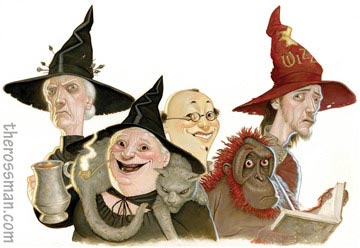 I'll get into each of the main groups and their arcs below (don't rush me now!), but I wanted to describe to you first the absolute beauty of the universe that Pratchett has cobbled together within his masterpiece creation. Yes, the Discworld is populated by witches, wizards, trolls, dwarfs, magic, castles, bustling medieval burgs, and all around strangeness that you've no doubt heard of before, but Pratchett's takes on these jobs, towns, and creatures is tweaked just enough to make them clearly his own. For example: The witches in DW are powerful indeed, and they do fly on broomsticks and hitch rides in the minds of animals and such at times, and people tend to avoid them if at all possible, but they're mostly wise women, midwives, and herbologists here — the wisest and the best, true, but they tend to only use magic as a last resort to any of the problems that come their way... Actually, not even then most of the time. Granny Weatherwax may be a wrinkled old
I'll get into each of the main groups and their arcs below (don't rush me now!), but I wanted to describe to you first the absolute beauty of the universe that Pratchett has cobbled together within his masterpiece creation. Yes, the Discworld is populated by witches, wizards, trolls, dwarfs, magic, castles, bustling medieval burgs, and all around strangeness that you've no doubt heard of before, but Pratchett's takes on these jobs, towns, and creatures is tweaked just enough to make them clearly his own. For example: The witches in DW are powerful indeed, and they do fly on broomsticks and hitch rides in the minds of animals and such at times, and people tend to avoid them if at all possible, but they're mostly wise women, midwives, and herbologists here — the wisest and the best, true, but they tend to only use magic as a last resort to any of the problems that come their way... Actually, not even then most of the time. Granny Weatherwax may be a wrinkled old crone "other one," but she's infinitely more proud of her "headology" than her ability to use strong magic (which she of course almost never performs). Headology for the uninitiated is basically using words and thoughts to get people to do what is right or needed without any spells or potions being used. It's different from basic psychology in that a psychiatrist would try to get you to see that what you fear isn't even real, and Granny Weatherwax would let you believe that it's real, but put a pretend barrier around you or give you a frying pan to swing in order to protect you from the imagined problem. The witches are very dominant and proud, but for the most part are not wicked, or green, or covered in warts (though they usually wish to be seeing as that commands even more respect from the villagers who typically come to them for advice and help).
And then there's Rincewind. Rincewind is the first hero protagonist that we meet in the Discworld Universe. He's a wizard who doesn't know any magic, but has the best developed street smarts on the Disc, and knows how to survive anything (by leaving it far behind him in his dust). Oh, and lest we forget DW's DEATH. DEATH is perhaps the most charismatic character in the series, despite the fact that he doesn't have a full grasp on emotions. The things that he loves most are life, kittens, his granddaughter Susan, and his horse Binky.
The number one thing you should know about Pratchett's Discworld is that it is mainly satiric in nature. YESSSSSS, each book has a story (and as stated several times in this review already, usually a very good one at that), but the plots are just a means to make fun of things or to show the reader a different side of subjects that they may take for granted in the real world (hence, SATIRE)... Only not as tedious or as hamfisted as how I just described it. For instance, The Truth is all about how Ankh-Morpork got its first real daily newspaper. Pratchett explains to the reader how the idea for such a silly-goose thing (cheap paper word-pressings of "news" that anybody on the street can read for a small coin or two — usually consisting of stuff that has no direct impact on their pathetic and dirty daily lives, like how the Patrician was arrested for attempted murder alongside an etching of a radish that's in a very crude, yet humorous shape) gets started and then eventually thrives. No matter the topic (be it assassinations, jingoism, Faust, Shakespearean royal murder plots, sexism, fairy tales, opera, dirty cookbooks, Santa Claus, silly foreign countries, the apocalypse, the Book of Genesis, vampires, the Industrial Revolution, time travel, or even the very, very end of all time), Pratchett makes it his and makes it funny. Think Hitchhiker's Guide to the Galaxy, only entertaining and witty the entire way through. But that's enough of that now; let me talk about the individual story arcs (and I'm going by memory alone here, so some of my facts may not be 100% spot on, but I just crammed in 36 books-worth of stories and adventure in over the course of one year... Cut me some slack if I don't get every little bit exactly right, you Klatchian slavedriver).
The Rincewind Arc
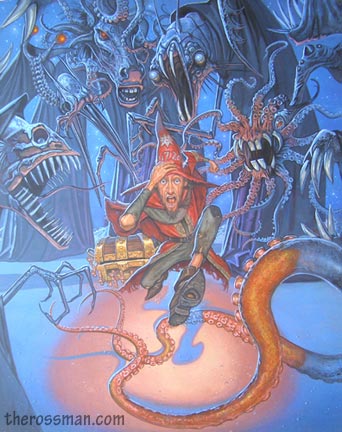 I honestly don't know how Pratchett not only milked 7 novels, but even more importantly any sympathy, out of the character of a cowardly wiz
I honestly don't know how Pratchett not only milked 7 novels, but even more importantly any sympathy, out of the character of a cowardly wizzard with no magical abilities whatsoever. But he did, and Rincewind (the middle-aged, fraidy cat, failed mage in question) is actually one of my favorite fictional characters of all time now.
Rincewind's adventures start off when he accidentally befriends the extremely rich (well, by the city-state of Ankh-Morpork's standards) and overly trusting first tourist of the Discworld, Twoflower from the Counterweight Continent. Twoflower introduces the idea of insurance to the bustling and dirty and slimy and dangerous city of Ankh-Morpork, which thusly leads to its unscrupulous citizens burning the whole town to the ground for the insurance payoffs. In order to not be lynched by the Patrician, Rincewind flees and is forced to take Twoflower with him, but unbeknownst to the failed wizard, he has part of one of the most powerful magical spells ever recorded stuck in his head, and with the end of the Discworld seemingly imminent (due to a fast approaching red star in the distance), he, well, the spell really, is needed back at the wizarding college of Unseen University. But shit hits the fan for the wizards (and the world as a whole) when they realize that finding and capturing a man who's made a religion out of hiding and fleeing is harder than getting a troll to count higher than 3 without using the words "many" and "lots." So with his new friends (including Hrun the Barbarian, Cohen the ancient Barbarian, and of course Twoflower) Rincewind sets off on a journey of non-eviceration... and maybe global salvation (if he's guaranteed it won't hurt).
After his adventures with Twoflower, Rincewind settles down for a little while and becomes an assistant to the Unseen University's Librarian (a man turned into an orangutan by the unstable magics floating around the place who refuses to let anybody try to figure out a way to turn him back into his original, less hairy form because there are less worries and more freedom in his new body. Ook). But this doesn't last when the eighth son of an eighth son of an eighth son shows up and starts up another apocralypse, this time turning the wizarding world upon itself in a giant civil war (FYI, wizards are usually the eighth son of an eighth son — the number 8 being very powerful on the DW — and they are not allowed to marry or have children. So when one does start a family, and he fathers an eighth son himself, that boy has the unlimited power of an uber-powerful sourcerer... Don't worry, there's no test). With the help of one of Cohen the Barbarian's many illegitimate children (Conina the Hairdresser), and a wannabe hero who makes Rincewind look like John McClane, our main protagonist does his best to ward off not only the demons of the Dungeon Dimension, but the most powerful magic user of recent history: the child sourcerer known as Coin.
After getting lost in the Dungeon Dimensions himself (in an uncharacteristic act of bravery [after being coerced into it by the Librarian]), Rincewind finds himself called forth back into the Discworld thanks to a boy who was trying to order up a wish-granting demon. Despite Rincewind being Rincewind, he's able to somehow grant the youth's magical requests (which perplexes not only himself, but the Demon King of Hell): to be the ruler of the world, to meet the most beautiful woman in all of history, and to live forever.
Then, after facing off the hoards of Hell and somehow escaping with his skin still intact, Rincewind almost gets a well-earned vacation (on a tropical island with a bevy of hot native womens about to make his life very pleasurable), but the wizards at Unseen University take it upon themselves to teleport him to the Agatean Empire on the Counterweight Continent under direct orders from the Ankh-Morpork Patrician, Lord Vetinari, who received a letter from the secluded sovereignty requesting "the Great Wizzard" to help with some internal struggle which could soon become an external one, and thusly of course, lead to global destruction. After meeting up with his old friends Twoflower and Cohen the Barbarian again (the latter who's joined by his Silver Horde of a handful of other decrepit and ancient conquerors — one of whom is in a battle-wheelchair), shit goes hubward and Rincewind finds that he has to do a whole lot of running away in order to set things right.
Rincewind finds himself in the middle of the lost continent of Four Ecks (XXXX) after finishing up his running away in the Agatean Empire, where he's chased by insane and godly kangaroos, drop-bears, poisonous animals of every size and shape, self-sheering sheep, and female impersonators. But after bringing back "The Wet" he finally meets up with the rest of the (real) wizards from Unseen University and is able to make it home... But then he anti-volunteers himself to go to the home of the Discworld gods in order to stop Cohen the Barbarian from returning the Fire to the deities in a most barbaric way that would more than likely end everything in the flat world once again.
Next...
The Witches Arc
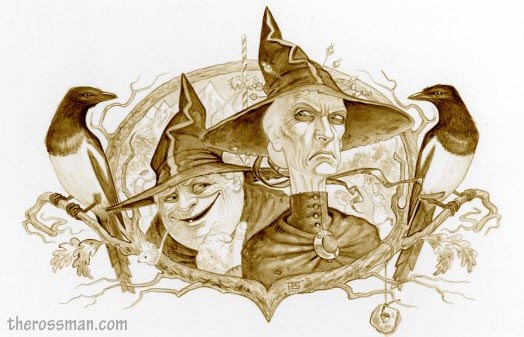 I'm going to ignore the first book in the Witches' series (Equal Rites), mostly because Pratchett didn't seem like he had a full handle on the idea of the witches of his universe in this story, but also because it sucks and we never even hear about the main protagonist who stars in it ever again. So I'll start by talking about the Macbethian and Hamletian Wyrd Sisters. Granny Weatherwax, Nanny Ogg, and Magrat Garlick (the Lancre coven of witches) find themselves in the midst of a battle for the throne of their little mountain shire... Well, that's basically all there is to this novel, but Pratchett makes up for the subpar introduction of Granny Weatherwax in Equal Rites by pretty much reinventing her here, and by acquainting the readers to her two most excellent compatriots in the witchy arts.
I'm going to ignore the first book in the Witches' series (Equal Rites), mostly because Pratchett didn't seem like he had a full handle on the idea of the witches of his universe in this story, but also because it sucks and we never even hear about the main protagonist who stars in it ever again. So I'll start by talking about the Macbethian and Hamletian Wyrd Sisters. Granny Weatherwax, Nanny Ogg, and Magrat Garlick (the Lancre coven of witches) find themselves in the midst of a battle for the throne of their little mountain shire... Well, that's basically all there is to this novel, but Pratchett makes up for the subpar introduction of Granny Weatherwax in Equal Rites by pretty much reinventing her here, and by acquainting the readers to her two most excellent compatriots in the witchy arts.
After sorting out the whole kingly affair over the crown, the three ladies hit the road to go settle some fairy godmothering in the far off land of Genua, which is pretty much the DW's version of New Orleans. Along the way Granny, Nanny, and Magrat bump into numerous living and fractured fairy tales, and even have a house or two drop on them (and Nanny's ruby work-boots). Soon the coven understands that Granny's twisted sister Lily Weatherwax (who thinks she is the good sister to Nanny's bad... and she may be right) is behind all the bizarreness that's encompassing the land, and with a little help from a transmogrified devil-cat, a cultured zombie, and some sharp thinking, the Lancre witches fight for what they think is right, and triumph over what they think is evil... Maybe.
Granny and co. then take some time off to travel the world and broaden their horizons before heading back home to find that the new king of Lancre has already set up plans for a wedding between himself and the youngest witch in the group, Magrat. Things would have gone well enough if it weren't for the invasion of the seriously evil Fair Folk from the other realm, and Magrat finding out that the reason she was getting married so quickly was because the cantankerous Granny Weatherwax stuck her nose in Mag's business without her knowing. With the help of the visiting Wizards from Unseen University though, and some huge chances and the enormous skills of both Nanny and Granny in their ability to manipulate people and things, everything ends as if it were nothing more than a midsummer night's dream.
After the official wedding between Magrat and King Verence II, Nanny Ogg tries to keep Granny Weatherwax's mind busy so that she won't turn bad — or badder — like Black Aliss, who cracked and started cackling like a mad woman, and also began making confectionary cottages out of gingerbread in order to entice little children into walking into her oven. One of Nanny Ogg's tactics is to take Granny into "The Great Wahoonie" (Ankh-Morpork) in order to stop the publication of a risque cookbook Nanny wrote and attributed to Granny, and to enlist the young Agnes Nitt into their coven for the good of Lancre (and Granny Weatherwax).
Then the Uberwald vampire family, the Magpyrs, comes to town (by way of protective seal being broken by King Verence, who invites them to the naming of his and Magrat's daughter). I believe this is the first time we're introduced to the idea of the Discworld Igors, and we also meet the Omnian priest Mightily Oats. Bad shit explodes in the small country of Lancre, the least shitty of which is Mightily Oats accidentally naming the newborn princess "Princess Esmerelda Margaret Note Spelling." Lots of blood gets drained, stitched-together dogs get killed (again), and people die... But Granny Weatherwax proves that she's the toughest old bitch this side of Michael Vick's kennels when she ends up putting the Magpyr's under her control through the use of some heavy headology and some old, dark magics. It was at this time that Granny actually leap-frogged Rincewind as my all time favorite fictional literary character... Well, slightly behind Jesus. Anyway, Granny shows up a lot more in the Tiffany Aching stories, but I'll get to those a little later, so don't hire an assassin or anything, I promise I'll cover her tales in just a bit, deary. I'm typing just as fast as a man in a golden hat with wings on it can fly... And now my analogies are being stretched as thin as the skin over the emaciated ribs of a mangy old talking dog. I do apologize.
The Ankh-Morpork City Watch Arc
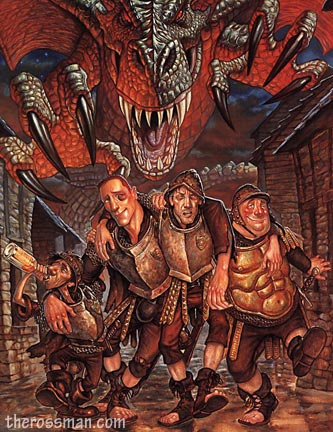 Many fellow fans of the Discworld series seem to regard the City Watch tales as the weakest of them all. They are morons. In fact, Night Watch is by far the best book Pratchett has written to date. So you naysayers can just go give yourselves the "Klatchian Stranger."
Many fellow fans of the Discworld series seem to regard the City Watch tales as the weakest of them all. They are morons. In fact, Night Watch is by far the best book Pratchett has written to date. So you naysayers can just go give yourselves the "Klatchian Stranger."
The City Watch books are all about Samuel Vimes and his motley crew of watch officers (made up of trolls, dwarves, werewolves, vampires, Nobby Nobbs, and the too-good-to-be-true Carrot Ironfoundersson). We first meet Sam in Guards! Guards! when he's pretty much given up... on everything. He's the head of the Night Watch, which is the biggest joke in the city; the Night Watch is mostly known for walking around in the dark, ringing a bell on the hour and yelling "It's 11 o'clock, and all is well!"... And if all isn't well, they're known to quickly walk away and find a street where all is indeed non-threatening to themselves.
Into this walks young Carrot Ironfoundersson, a 6'6" red-headed man raised by dwarves with a sunny disposition, and as honest as Granny Weatherwax's hat is pointed. Carrot becomes a member of the watch (mistakenly believing that it is truly an honor to serve on it), and single handedly turns it from a group of cowardly and drunken losers into the best run, most diligent small army of straight-laced losers to ever walk a beat. But I'm getting a bit ahead of myself now.
Anyway, in the first City Watch book Carrot helps Nobby, Colon, and Sam Vimes realize that they are the only ones who can stop a plot by some innovative usurpers to the Patrician's throne who (with the help of a stolen book of magic) have summoned a dragon for their "found king" to slay and win the people over with. Unfortunately for them (and, well, everybody in the city), the dragon is too powerful for them to control and takes over as king himself. After a big hubbub with Sam Vimes coming to his senses and learning to lead again, and Carrot trying to arrest the dragon, everything eventually ends satisfactorily... Except for all the dead. And the burnt-down Watch House. But after their handling of the situation, the reinstated Patrician offers the Night Watch anything they want as a reward. Gratefully they accept a slight pay raise, a new tea kettle, and a new dart board.
After the dragon fiasco, the Night Watch is forced to take on a few new recruits of different ethnic minorities (in order to appease the growing hoards of dwarves, trolls, and creatures of the night who soon call Ankh-Morpork home): Cuddy the dwarf, Detritus the rockman troll, and Angua the sultry female werewolf are the first to join the ranks. Soon everybody is thrown into total confusion when the almost mythical first (and only) handheld firearm (the "gonne") is found and put to use in order to try and assassinate the Patrician by an unknown assailant. Lots more people die, solid relationships are formed, and a prophecy about the return of the true Ankh-Morpork king is pshawed and soon forgotten by those at the center of it.
Soon after the Watch gets even more recruits, and only just in time to help cover all the leads in a new group of murders that spring up around the city that seem to have something to do with clay golem creatures, candles, novelty rubber prophylactics, and yet another attempt to wrest control of Ankh-Morpork from Vetinari. Thanks to Carrot's loyalty to duty, Cheery Littlebottom's (the new dwarf forensics specialist on the Watch) eye for details, and Vimes' inability to give up the goat, the day is saved once again, and there was much rejoicing. And Angua is hot.
Global politics (involving wars over barren and only recently unsubmerged islands, and the underground fat deposits of vampire and werewolf-laden Überwald) then take over Sam Vimes' time as he finds himself a nobleman thanks to his recent marriage to Lady Sybil Ramkin, and indispensable as a diplomat to the conspiring Lord Vetinari. But then all that seems unimportant to Sam after he finds himself transported back in time (along with a psychotic, twisted, and crazy murderer) by some temporally out of whack magic to the time of the events that would eventually make him who he is today... Or 30 years in his then future. The events of Night Watch (the time-traveling story in question) make for the most fulfilling and best written plot of all the Discworld books that Pratchett has created thus far... But that may just be my opinion seeing as I'm a sucker for time travel stories. Seriously, The Terminator and Back to the Future are awesome.
And finally, Vimes and his crew are then caught up in the middle of a centuries-old race war between the trolls and dwarves as the anniversary of the Battle of Koom Valley approaches. The Battle of Koom Valley being an ancient and epic battle between the two long-time enemies in which both sides declared victory. Although now, at the big anniversary of the battle, tensions rise to all time heights, and a board game, a rocket carriage, a new vampire constable, and a book about cows play their roles in sorting out the mess that everybody on the continent finds themselves in. Good shite indeed!
The Wizards of Unseen University Arc
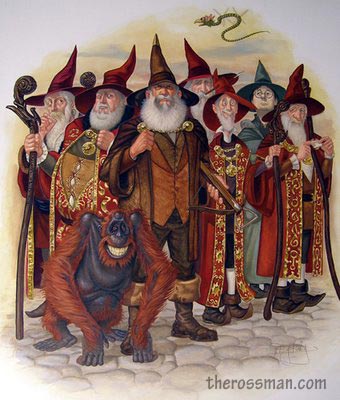 First of all no, Terry Pratchett did not rip off Harry Potter and his Hogswart School of Witchcraft and Wizarding, you filthy Nobby Nobs; Rowling and her wizarding school ripped off Pratchett and his Unseen University, which he had started writing about in the early 80s... Crivens! Get your facts straight before acting like a sodding poofter and attacking like a group of war-mongering little Pictsies!
First of all no, Terry Pratchett did not rip off Harry Potter and his Hogswart School of Witchcraft and Wizarding, you filthy Nobby Nobs; Rowling and her wizarding school ripped off Pratchett and his Unseen University, which he had started writing about in the early 80s... Crivens! Get your facts straight before acting like a sodding poofter and attacking like a group of war-mongering little Pictsies!
Anyway, at the start of the Discworld series the Wizards of Unseen University were all overaggressive, petty, and sometimes villainous bastards whose traditions went that the only way to climb up the ladder of power in the place was for the man on the rung directly above you to die — naturally or "accidentally".... though usually accidentally by way of a knife in their back. But all that changed after the great wizarding war that took place in the novel Sourcery. Since then Archchancellor Mustrum Ridcully has been in charge of things in the school (mostly by proving to be quite impossible to kill), and with the ever-changing escalator to the pinnacle stopped, the chairs at the top of the University have become stabilized with a stable of almost lunatic faculty members who'd give the crew of One Flew Over the Cuckoo's Nest a fantastic run for their goddamn crazy money.
So, with Ridcully in charge of things the wizards find that the world starts to respect them again and not just fear or hate them. Thanks to this they're called upon to help the Patrician and Sam Vimes on a number of missions and adventures, and are usually side characters in most books, and only have one or two where they are the main protagonists and actually push the plot forward themselves. That's not to say that they're unentertaining (for they are a great ensemble of insanity), just that Pratchett seems to understand that like magic in his world, it's more important to know when NOT to use it/them.
The Wizards of Unseen University make appearances in more than half of the DW books written so far, and the next novel in the series coming out this year, The Unseen Academicals, will focus on them and football in their universe. Spank my ass octarine and blue! I am so ready for it. I just want to see the Wizards cut loose again, even if it is in the department of athletics and not disc-saving... which it will almost definitely entail too. But I digress, next comes...
The DEATH Arc
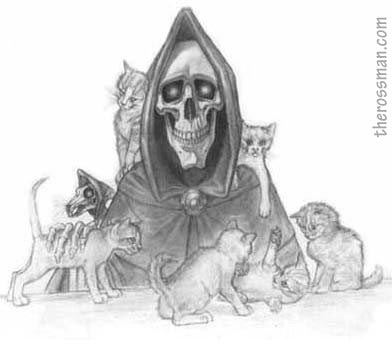 The Discworld's DEATH is the greatest Grim Reaper ever written. Yeah, he even tops the one from Bill and Ted's Bogus Journey (mostly because the Discworld's DEATH is not just a one-note character and is more fully developed than most protagonists who were born with feelings, emotions, and internal organs). DEATH is a curious entity; he only exists because people expect him to, and he has an unholy fascination with what makes something "alive" before he has to collect its soul after it passes on (he finds it ever so insulting whenever people insinuate that he himself kills things). He's got a manservant who was once the greatest wizard who ever lived, an adopted daughter, and a black and white offshoot of the Discworld's universe in which he lives wherein the laws of time and space mean nothing (where it can either take you all afternoon to cross a room in his small Victorian house, or two steps [depending on how you look at things], and where a swing hung from a tree can be strung up between two opposite branches and pass right through the trunk).
The Discworld's DEATH is the greatest Grim Reaper ever written. Yeah, he even tops the one from Bill and Ted's Bogus Journey (mostly because the Discworld's DEATH is not just a one-note character and is more fully developed than most protagonists who were born with feelings, emotions, and internal organs). DEATH is a curious entity; he only exists because people expect him to, and he has an unholy fascination with what makes something "alive" before he has to collect its soul after it passes on (he finds it ever so insulting whenever people insinuate that he himself kills things). He's got a manservant who was once the greatest wizard who ever lived, an adopted daughter, and a black and white offshoot of the Discworld's universe in which he lives wherein the laws of time and space mean nothing (where it can either take you all afternoon to cross a room in his small Victorian house, or two steps [depending on how you look at things], and where a swing hung from a tree can be strung up between two opposite branches and pass right through the trunk).
The personification of DEATH appears in every single Discworld book except for one of the Tiffany Aching series, but we don't really get a feel for the skeleton behind the hood until the first book in his arc: Mort. DEATH changes everything he's ever known when he (for some reason that not even he can explain) adopted little orphan Ysabell and took her to his home to raise as his own child. Being undead and unalive and living in a land where time does not move normally caused some trouble for the Grimmer when the girl does not age past 16 (remaining a perpetually bratty teenager). So DEATH does the most sensible thing he can think of: he tries to pass her off onto another poor schmuck to make the girl his problem. The poor schmuck in question is Mort. Mort is a poor farmer's son who's just trying to become an apprentice to somebody who doesn't have anything to do with farming. Despite this hope, DEATH (the ultimate reaper) takes the boy on as his probationary student. This causes an almost complete collapse of the known Discworld Universe, but DEATH isn't too upset when Ysabell and Mort fall in love and his master plan comes to pass.
Then the metaphysical shit hits the fan when the Auditors of Reality (the personification of "order" in the 'verse) take aim at eradicating life (something they consider unpredictable, disorderly, and all around rather icky), and therefore DEATH (who doesn't consider himself the enemy of life, but a very important part of it). They sack DEATH from his job and make him mortal, and then replace him with a creature that is more smoke and vengeance than a reaper of souls. The New DEATH then vows to take the remaining life of DEATH, leading to a showdown of epic proportions, and possibly a dance with old widow Flitworth.
After a while Mort and Ysabell have a daughter, Susan, and somehow Susan inherits a bunch of her grandfather's powers and abilities to see the world as it truly is, and to step outside the limits of Discworld space/time in order to travel temporally forwards and backwards through the fourth dimension. This makes her the best candidate in the world for DEATH's replacement when he takes some time off to mourn the loss of some people he'd grown very attached to during his duties as of late. Because he is DEATH, he is still bound to take the souls of those who pass on; it is not in his nature to break the rules in such a big way, and let any mortals get a pass. Anyway, young Susan becomes the new Grim Reapette, and does her best to fulfil her duties... that is until she becomes infatuated with the lead singer of a band that's pioneering a new kind of music (aka Music With Rocks In) on the DW, and driving the masses into screaming puddles of hormones, and driving the basic reality of the world towards a possible oblivion. But at least DEATH finds out one very important thing in the end: Why does the Duck Man have a duck on his head.
Things between Susan and DEATH become a little strenuous after that incident, but Susan does stand by her grandfather, and even comes to help him on what could be his biggest problem to date: the disappearance of the Hogfather (the Discworld's version of Santa Claus) on Hogswatch Night. Oh, then she helps him when history is ultimately shattered and haphazardly rebuild by some monks with too much time on their hands.
The Moist von Lipwig Arc
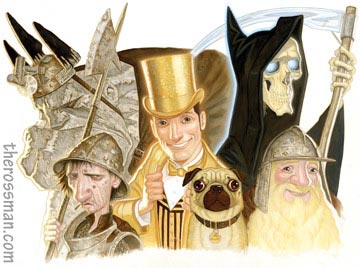 One of the most recent characters to be added to Pratchett's world is Moist von Lipwig, con artiste extraordinaire. Moist was spared the gallows after making a deal with Patrician Vetinari to rescue the all-but-buried Ankh-Morpork Post Office and give it some electroshock therapy in order to get just a small pulse out of it. Due to the fact that the entire Post Office building is filled with undelivered mail (and an inch or two of pigeon droppings), golems are soon brought into play (other than Mr. Pump, who's keeping a stern eye on the ready to bolt Moist whenever he sees a chance), and with them comes Miss Adora Dearheart, a chain-smoking love interest of sorts for Moist, and renter of the city's finest clay men.
One of the most recent characters to be added to Pratchett's world is Moist von Lipwig, con artiste extraordinaire. Moist was spared the gallows after making a deal with Patrician Vetinari to rescue the all-but-buried Ankh-Morpork Post Office and give it some electroshock therapy in order to get just a small pulse out of it. Due to the fact that the entire Post Office building is filled with undelivered mail (and an inch or two of pigeon droppings), golems are soon brought into play (other than Mr. Pump, who's keeping a stern eye on the ready to bolt Moist whenever he sees a chance), and with them comes Miss Adora Dearheart, a chain-smoking love interest of sorts for Moist, and renter of the city's finest clay men.
After several assassination attempts, and a major competition with the Grand Trunk Clacks Line (a sort of telegraph service that recently popped up on the Disc), and the creation of pre-printed, collectible, and sometimes used as a currency stamps (thusly revolutionizing the post forever), Moist is called to duty again by Vetinari, this time to go do that voodoo that he does so well on the Ankh-Morpork banking system (that is unfortunately out of gold and yet still runs on the gold standard). Making Money is one of the scariest books mostly because it makes light of economic fubars the likes of which we currently find ourselves in in the real world. It also makes it clear that we need a man like Moist on our side in the real world too.
And finally comes the:
Tiffany Aching Arc
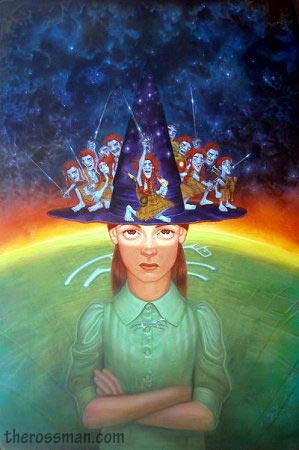 I loved the Tiffany Aching books, despite Terry Pratchett and his publishers pushing them as "young adult" novels. They don't read like your typical YA stories though. The Tiffany Aching books look and feel just like the other 30+ Discworld novels, only they star a brave and common sense-filled young girl and not an old cynical witch, a cowardly grown wizzard, or a talking skeleton. And Tiffany Aching is one hell of an awesome character.
I loved the Tiffany Aching books, despite Terry Pratchett and his publishers pushing them as "young adult" novels. They don't read like your typical YA stories though. The Tiffany Aching books look and feel just like the other 30+ Discworld novels, only they star a brave and common sense-filled young girl and not an old cynical witch, a cowardly grown wizzard, or a talking skeleton. And Tiffany Aching is one hell of an awesome character.
Young Tiffany starts off her adventures on the chalk plains of the DW, as one of the youngest children of a large family. She's nothing special to the people of the Chalk, but the Nac Mac Feegle see something inside her and soon Tiffany's made their queen. The Nac Mac Feegle are very small blue men tattooed from head to toe who talk in a hard to understand dialect (think rowdy Scottish Smurfs who love to fight all the time, especially with creatures hundreds of times their size). The Nac Mac Feegle help Tiffany save her little brother from the Fairy Queen, and then they escort her to Granny Weatherwax and Nanny Ogg's domain in order for her to learn to be a witch proper. She does battle with both the Hiver and the Wintersmith (besting other boastful witches-in-training along the way), and soon finds herself taking up the reigns left open by her own grandmother, who was a witch of sorts to those on the Chalk who needed guidance or just a swift kick to the pants.
Other Tales
True, most of the books in the Discworld Library have to do with the ongoing arcs I just spent 4 days typing for you above, but there are still quite a few stand alone novels with characters that either just show up as background actors in other books, or never pop up again. Brutha and the god Ohm from Small Gods; Pteppic the assassin/king in Pyramids; Victor, Ginger, and Cut-Me-Own-Throat Dibbler in Moving Pictures; William de Worde and his newsroom in The Truth; The Amazing Maurice and his Educated Rodents in the book of the same name; and the cross-dressing platoon in Monstrous Regiment are all highly entertaining characters in some fantastic stories, only they each headline only one tale... so far. But still good stuff indeed. Hold on for a minute while I self-fellate while thinking of all the smiles and tears that Pratchett's world has brought me.
Done and done. Anyway, I cannot recommend these books enough. The only people I would not advise to read them are those with very thin skin who can't take a joke or a jab. These books mock everything from religion, politics, and gender inequality to time travel, race wars, and ugly, nobby motherfuckers. No matter what you think or believe or are, a shot will be taken at your expense before all is said and done. If any of Terry's words hurt you, well, you need to grow a thicker hide and you are the world's biggest PC pussy.
Unfortunately for my review this world and its history is just too goddamn big. Even this, my longest rant/review/rating ever barely scratched the surface of the DW and what makes it so much fucking fun. Pretty much every character line and every bit of Discworld philosophy is both hilarious and deep. Attention to detail is meticulous (at least in the later novels when Terry started making a conscious effort to bring some order to his realm), and after a while the characters and their cities and countries become friends and vacations spots for you. Christ, I don't want to sound like a "Reading is Fundemental" poster in the library, but really, Pratchett's shit is why words were invented in the first place. He plays fast and loose with them, gets them to act sharp and witty when he wants them to be, and downright and absolutely hilarious when he's not trying to make a point.
So, unless you're blind (reading 36 books in a row with just your fingers on Braille would leave you with bloody stumps in no time), or a complete pussy who doesn't like somebody openly mocking your lifestyle, start reading. I'd begin with The Colour of Magic and The Light Fantastic, skip Equal Rites, and then from Mort onward read them in the order that they were published (finding that out is what Wikipedia is for, dingleberry). Then, in a few months to a few years, when you put down your last book, you can come back and thank me. I take cash, gift certificates, and trips to England to meet my favorite authors.

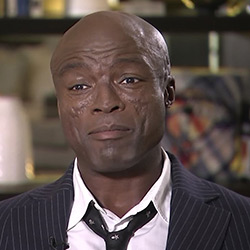
MALCOLM Z
36 goddamn mothafuckin' books, and not one goddamn black man. Not even one fuckin' Lando Calrissian or nothin'. Fuck you, Pratchett. Ignorant white mothafuckin limey bastard...

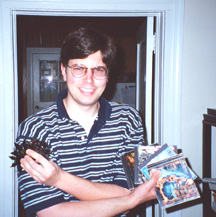
The Avantasia'd
MEGAPLAYBOY
Heeeeeell yeah! That is the shit that I'm talkin about, my bitches. Dwarves, trolls, wizards, creatures of the night, and a kick ass British sense of humour. Discworld is where it be, and it be where I'm at. And I'm all down with that shit.
Now, you prolly ain't really readin' no more after all that crap the Rossman wrote above me, so jus' be secure in knowin' that my love for the Disc is flowin'. And growin'. Then my seed in it I will be sowin'.


